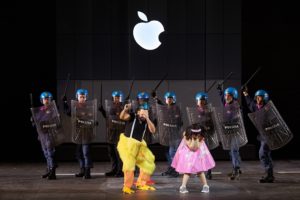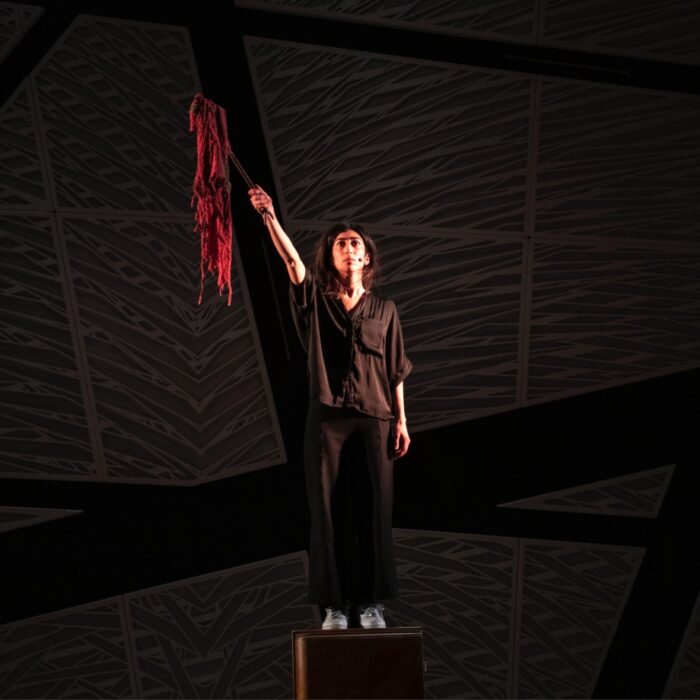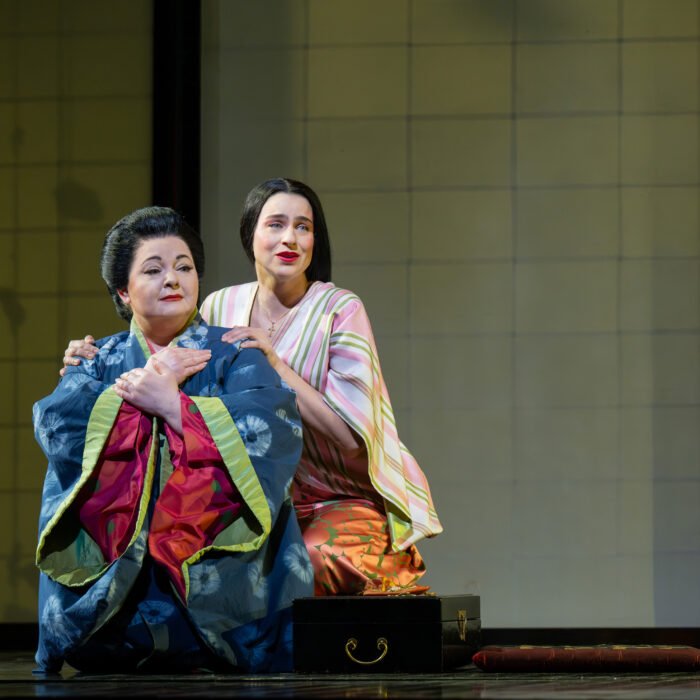
Macerata Opera Festival 2018 Review: The Magic Flute
Graham Vick’s Political Agenda Desecrates Mozart’s Final Masterpiece
By Alan NeilsonThe mass movement of people that is taking place, from poor countries to the wealthier countries of the West, is causing social upheaval and human suffering on scale which has not been seen since the end of the Second World War. Millions of lives have been affected by this mass migratory flow, some positively, some negatively. Earlier this year, in the small town of Macerata in central Italy, a series of events occurred that destroyed the lives of a few people and deeply affected the lives of many more. Innocent Oseghale, a Nigerian migrant and drug dealer, murdered and cut up the body of Pamela Mastropietro, an 18-year-old girl, who at the time was in care. He then attempted to leave the country, before being caught at the airport and arrested. In an act of revenge, Luca Traini went on a shooting spree, wounding six black migrants in the town. Obviously, tensions in the town were very high, and the politicians tried their best to constrain them.
The British director, Graham Vick, who has been engaged to direct Mozart’s “The Magic Flute” for this year’s Macerata Opera Festival decided, rightly or wrongly, to make the migrant crisis one of the key features of the production. The immediate effect was to provoke politicians from the anti-immigration party Lega Nord to condemn Vick’s production. A spokesman for the party, Tulio Patasini said, “It is absurd to use theatre to justify a flawed immigration policy, which has in particular affected the Maceratians,” which immediately drew a response from Mario Morgoni, a member of the centre-left, Democratic Party, stating, “Among the acts that prepare the way for anti-democratic regimes, intolerance of culture and art are the most disturbing.” Full marks, therefore, must go to Vick for making his production relevant, and for opening up further controversy surrounding these disturbing events.
Desecrating A Masterpiece
The actual opera is performed in an unusual venue; an open air semi-circular, ex-sports arena called the sferisterio, which was used for an old Italian sport called pallone col bracciale, as well as other events such as bull fighting and circuses. The stage, which is approximately 75 meters in length, is a gigantic space, and one of which Vick and his set designer, Stuart Nunn, made full use. Looking at the set prior to the start of the performance, it was possible to get an idea about the production; three large buildings dominated the centre of the stage, St Peter’s in Rome, a European bank and the “Apple” headquarters. In front of which were wire fences. At each side of the stage was a large migrant camp, full of tents, heavily populated, with its inhabitants going about their daily business. From the moment of entering the arena, therefore, it became fairly clear as to the themes that were about to be explored in this production. The initial impression was certainly a very positive one, as such themes could fit nicely with this opera. After all, the ambiguity contained within the text of “The Magic Flute,” which is itself an allegory, provides the director with a substantial amount of leeway on how to approach it, providing, of course, they remain faithful to the work’s underlying message of tolerance and enlightenment, which is certainly what is needed at this time, on all sides of the debate.
Unfortunately, during the overture, when protesters crowded the stage, waving placards against big business, the church and the banks, it became clear that Vick had no intention of leading the members of the audience on a journey of exploration, or of attempting to convince them of his vision, not at all! His protesters turned towards the audience, demanding they accept their own part in society’s collective guilt, their banners screaming such vacuous statements as, “We are all foreigners in this world.” And this was to be only a foretaste of what was to follow, for Vick had decided to embrace the performance values of agitprop theatre, which many may have thought to have disappeared in 1989, following the fall of the Berlin Wall. He produced a jaw-dropping spectacle of which any totalitarian regime would have been proud, whether Communist, Fascist or of a religious variety. Time after time, the audience was told what is right, it was not encouraged to think about, or reflect on, the issues. At the beginning of Act two, Sarastro, took to using a microphone and addressed the audience as a demagogue would a political gathering or a preacher his flock. It was miserably condescending. Much worse, however, was the appearance of Tamino during the interval, in which he instructed the audience on how to sing the following phrase “Li renda immune dall’error. Tocchino alfin l’impervia meta.” (“Make them immune from error. So they can eventually reach their impenetrable goal”) Then during Act two, Sarastro asked the audience to stand, and accompany him, in singing the phrase, which a depressingly large number of the audience appeared happy to do. And so it continued in the same vein.
Visually, Vick took every opportunity to play up the brutality of life on the streets, whether as a migrant or as a homeless Italian. Obviously, it was necessary to throw in a little gratuitous fornication in the process, and introduce a bulldozer, which the Lega Nord Italian Interior minister had made reference to, as a way of clearing the gypsy camps, and which actually played the role of the serpent which attacked Tamino at the beginning of Act one. Guantanamo Bay type torture was an opportunity that was simply too tempting an opportunity to be ignored; Papageno and Tamino were hooded and strapped to chairs and subject to an interrogation. It was a thoroughly grim and unremittingly depressingly spectacle, bereft of any hint of humor.
Forget Mozart
There was little attention paid to Mozart’s music, Vick had an agenda, which he was determined to follow. This was a production that focused on the violence and misery of the society, whereas Mozart’s music is reflective, optimistic and ultimately uplifting, that delights in the human condition. For the roles of Papageno and Papagena, the music is light, vibrant and fun. Vick’s Papageno, however, meets his Papagena, who is drunk, living in a bin. Their final duet, “Pa…, pa…, pa…, pa…, Papagena…” in which they at last find the love for which they had both been searching, takes place amongst corpses wearing life jackets, in a reference to the migrants who have drowned trying to cross the Mediterranean Sea. As a final insult to Mozart’s music, and indicative of Vick’s high-handed direction, the final bars of the opera were completely drowned out by the fireworks, set off to celebrate the destruction of Western society, as the buildings of the European bank, the “Apple” headquarters and St. Peter’s collapse, the entire cast dancing ecstatically in celebration.
The finale of “The Magic Flute,” which should be a celebration of Tamino’s success in overcoming the obstacles on the path towards enlightenment, was completely reinterpreted as a celebration of the revolutionary destruction of Western society, and was indicative of Vick’s agenda. As he, himself opines in the program, “ in order to create, it is first necessary to destroy.” Destroy Mozart, in his case.
Lost in the Mess
In the process, the musical side of the production struggled to impose itself. The Orchestra Regionale delle Marche under the musical direction of Daniel Cohen, gave an adequate, if inconsistent performance. Some parts sparkled. For example, the overture was energetic and lively, with its contrasting sections nicely defined, and the lighter numbers had a pleasing rhythmic bounce. Other parts were slightly wayward, for example the prelude to the second act, lacked cohesion and did not impress. Cohen managed, with great skill, the very difficult feat of co-ordinating the sound of the orchestra and the singers, who at times where standing vast distances from each other.
The singers varied in quality, although all performed at least to an acceptable standard. The standout performance of the evening, however, was undoubtedly Valentina Mastrangelo in the role of Pamina, whose strong soprano had a beautiful timbre, with a bell-like quality in the upper register, a pleasing coloratura, and smooth legato. Her diction was crystal clear, and she showed good acting qualities by convincingly transitioning from a naïve teenager to a seductress with great skill.
Giovanni Sala put in a strong performance as Tamino. Playing the part of a protester, he was attacked and eaten by the bulldozer, before being saved by the three ladies. He, too, showed good acting skills and had a good stage presence, despite the insipid choice of clothes. He gave an expressive performance, phrasing his lines with finesse and intelligence. His sweet sounding voice displayed flexibility and strength.
Star-Crossed Losers
Playing Papageno was the baritone, Guido Loconsolo. He made an exciting entrance from the back of the seating area, dressed as a large chicken, and for a minute or two gave the impression that the opera was back on course. Unfortunately this was not the case, he soon stripped away the top half of his costume, revealing a dull commonplace shirt and braces, and played the character with little that could actually be classed as humor. Moreover his physique and his strident demeanor had little in common with the cowardly, but good natured character one normally finds. Vocally, he made a good impression. The voice has a pleasing timbre, with a strong warm middle register, matched by quality in the lower register. However, he never convinced as he moved up the scale.
His Papagena, Paola Leoci, gave a vibrant performance, which for most of her time on stage, she spent sitting inside a wheelie bin. Her voice was strong, clear and flexible. She played her part in making the duet with Papageno almost humorous, despite the stage being littered in dead bodies.
Tetiana Zuravel made an fairly convincing Queen of the Night. Her voice was possibly a little small for the vast space of the sferisterio, and she never truly convinced in the role. Nevertheless, her voice displayed flexibility and consistency, although she occasionally lost a little strength and focus on the top notes during the coloraturas.
Sarastro was played by the bass Antonio di Matteo. His heavy bass has a rich dark texture, and he sang well, despite at times displaying a little inflexibility. Unfortunately, the lasting memory will be of him lecturing the audience on a microphone, dressed in a dark suit.
Manuel Pierattelli made an unpleasantly convincing Monostatos, seemed to enjoy his role of terrorizing people, and used his strong colorful tenor to good effect. The Speaker was essayed by Marcell Bakonyi. Although a fairly dull role, he impressed with his strong authoritative bass.
Lucrezia Drei, Eleonora Cilli, Adriana di Paola as the three Ladies all performed successfully. They acted and sang their roles well, their voices complementing each other perfectly, yet at the same time they maintained their own distinctive personality and sound. In particular, the First Lady, played by Lucrezia Drei, had a strong voice, and the ability to create a strongly defined character. Ilenia Silvestrelli, Caterina Piergiacomi and Emanuele Saltari gave confident and pleasing displays as the three Boys.
The entire production, regardless of its contempt for Mozart’s music, was a pessimistic reading that was visually ugly, brutal and lacked any charm whatsoever. Graham Vick is a director who has produced many successful and engaging productions in the past, and knows exactly what makes for a successful reading of an opera. However, in this case, his vision of “The Magic Flute” for the Macerata Opera Festival missed the mark with his political agenda seemingly blinding him to the true nature of the work.


